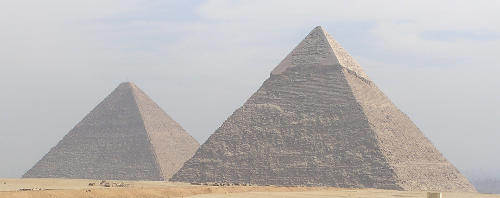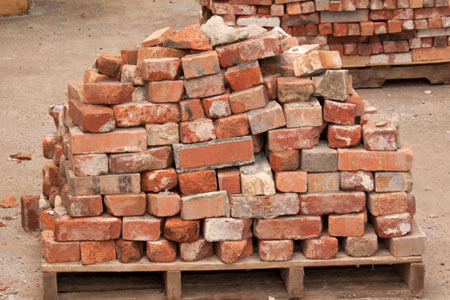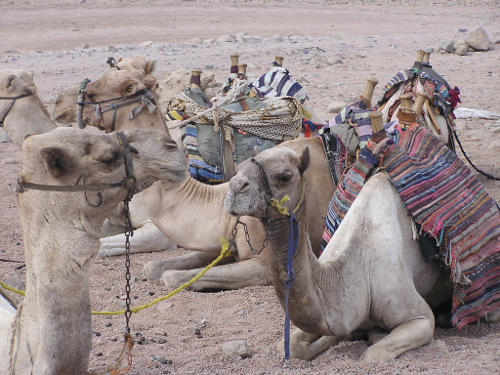A Pepper Grinder Post
Easy Egypt
Bear with me today as I imagine an alternate version of Moses's return to Egypt. As you probably remember, Moses was born at a genocidal time in Egypt, when Pharaoh had commanded that all male Israelite babies be drowned in the Nile. In an attempt to protect her baby, Moses's mother put him in a waterproof basket and set him afloat in the Nile. The daughter of Pharaoh found him and felt sorry for him. She adopted Moses and raised him like her own son.
In spite of being raised in the lap of luxury, Moses seems not to have lost his sense of identity as an Israelite. One day, when Moses was grown up, he saw an Egyptian beating an Israelite. Moses killed the Egyptian, and hid his body. When Pharaoh heard about this, he tried to kill Moses, and Moses high-tailed it into the desert. After many years, during which Moses married and worked as a shepherd for his father-in-law, God appeared to Moses in a burning bush and commanded him to go back to Egypt and rescue the Israelites from the oppression of the Egyptians. It's at this point in the story where I want to insert my purely fictional story.
* * * * *
 The scenery was starting to look familiar to Moses now. He gripped his staff tighter and headed for the place where he knew he would find the brick kiln, with swarms of Israelites being bullied by sadistic Egyptian foremen. As he crested the sand dune, he saw the kiln right where he remembered it, but the rest of the scene looked strange. Although he saw a mix of Egyptians and Hebrews, all of them were sitting on piles of bricks or on the ground, and they looked relaxed. Most astonishing of all, the Hebrews and Egyptians were talking to each other in what appeared to be a friendly way.
The scenery was starting to look familiar to Moses now. He gripped his staff tighter and headed for the place where he knew he would find the brick kiln, with swarms of Israelites being bullied by sadistic Egyptian foremen. As he crested the sand dune, he saw the kiln right where he remembered it, but the rest of the scene looked strange. Although he saw a mix of Egyptians and Hebrews, all of them were sitting on piles of bricks or on the ground, and they looked relaxed. Most astonishing of all, the Hebrews and Egyptians were talking to each other in what appeared to be a friendly way.
Moses wasn't sure who to talk to, so he decided to zero in on one young man who was chatting with a slightly older Egyptian. As he drew closer, he expected to hear the Egyptian berating the Israelite for not making enough bricks. This is what Moses heard instead.
"Listen, Simeon. You're a real good worker, and I appreciate that. All I'm asking is that you slow your pace down a little bit. You've got to understand; when you work as fast as you do, it makes your union brothers look bad. We don't want the big boss to develop unrealistic expectations."
"Pashti, you know some of these guys are just lazy!"
"I know nothing of the sort. Some of them may have disabilities that prevent them from working as fast as you. The point is, we've got you a sweet contract. You don't need to break your back. As long as you meet the minimum quota, you get paid the same, no matter how many bricks you make. I just want you to be a little more relaxed."
Simeon looked stubbornly at the ground. "But I get bored when I work too slowly."
"Listen kid, you're young. You've got a lot of good years ahead of you. All I'm saying is that you pace yourself. Get it?"
"Yeah, I guess."
"And another thing; stop looking grumpy. Save that for the weekend when the Succoth Slave-drivers demolish your Hebrew Herdsmen."
"As if! You're going to be crying like a little girl when you see what the Herdsmen do to you."
"We'll see, kid. We'll see. I've got to go meet with the straw committee to make sure they keep you guys supplied with what you need. I'll see you around."
"Not if I see you first!" Simeon and Pashti were smiling as they did a fist-bump.
Pashti sauntered off, and Moses edged closer to Simeon.
Moses whispered, "You are a son of Abraham, are you not?"
Simeon looked slightly taken aback. "My dad's named Eli. But I suppose Abraham is back there somewhere in the family tree."
Moses straightened up and looked Simeon in the eye. "I have been sent by Yahweh, the God of the Hebrews, to deliver you from the cruel bondage of the Egyptians."
"Listen, buddy. If you're trying to get me interested in joining a rival union, forget it. United Brickmakers has done fantastic things for us, and there's no way I'd jump ship."
 Moses was starting to feel annoyed with this cheeky young man. "I need to meet with the Israelite elders to tell them that God is going to deliver them from these uncircumcised Egyptians and take them to the land promised to Abraham, Isaac, and Jacob."
Moses was starting to feel annoyed with this cheeky young man. "I need to meet with the Israelite elders to tell them that God is going to deliver them from these uncircumcised Egyptians and take them to the land promised to Abraham, Isaac, and Jacob."
At the mention of circumcision, Simeon looked genuinely alarmed. "Listen, man. Don't use the 'C' word. It just emphasizes our differences. We need to work together. Do you want to have to sit through another lecture by that boring guy from H.R.? Who are you, anyway? Don't you know how things run around here?"
"I am Moses, the son of Amram."
A light dawned on the young man's face. "Now I get it! My dad told me about you. You're that wacko that killed an Egyptian years ago. You've been away a long time, haven't you?"
"Well, yes, but ..."
"Okay, look. I understand that you've been out of the country for a while. You don't know what's gone down. Take a load off your feet for a minute, and I'll set you straight."
Moses's annoyance was overcome by his curiosity, and he sat down on the pile of bricks Simeon had gestured at.
"Listen, I've heard stories about what things were like in your day. I always figured it wasn't as bad as the old geezers made out, but maybe it was. In any case, things have really changed. Not long after you split, Pharaoh and his chief slave driver attended some kind of management conference. The guy running it said that managers needed to look at which employees were most crucial to the organization, and treat them well. He had all sorts of statistics, Power Point presentations, and case studies to show that managers who treated their best employees badly were headed down a bad path. He talked about slave uprisings and work slow-downs."
"Apparently, it was an excellent conference, and Pharaoh was convinced. He realized that if he didn't have us to make his bricks, he wasn't going to be able to build his pyramids. He started making changes. At first, people like my dad were skeptical. They thought when he started calling slave-drivers, 'work facilitators,' and slaves, 'employees,' that it was all just for show. But then, guess who came to give a talk to the Hebrew foremen?"
"I have no idea," said Moses, whose head was spinning.
"It was Pharaoh himself! Mister Big. Dad was expecting him to rant about meeting brick quotas, but instead he started talking about wanting to empower his employees and give them ownership of the brick making process. Pretty soon, the changes began. Any employee who had an idea about improving the brick making process was encouraged to talk to his foreman about it. They set up grievance committees, which often sided with the workers. They started giving an all-expense-paid vacation to a resort on the Red Sea every month, to the person who contributed the best idea for improving safety."
 "But all that was just the beginning. We got salary increases, and all kinds of benefits. I've got Pharaoh making matching contributions to my 401K, a killer health plan, and even a dental plan that pays for everything after a small deductible is met." At this, Simeon opened his mouth proudly, to display a glittering set of gold fillings.
"But all that was just the beginning. We got salary increases, and all kinds of benefits. I've got Pharaoh making matching contributions to my 401K, a killer health plan, and even a dental plan that pays for everything after a small deductible is met." At this, Simeon opened his mouth proudly, to display a glittering set of gold fillings.
"And then, of course, there's the union. They really take good care of us."
Moses didn't understand many of the strange phrases Simeon was using, but he could tell that the young man seemed genuinely pleased with the way the Egyptians were treating him. He was dumbfounded. On the long trip from Midian to Egypt, he had never dreamed that he might find the Israelites content. He didn't know how he could get through to this callow young man, but he decided to make one more attempt. "Simeon, I see that the Egyptians are treating you better than they were when I left, but the God of Israel has sent me to lead you out of this land and into the promised land--a land flowing with milk and honey."
"Oh, now I get it. So this is a relocation proposal. We'd consider it, of course, but it would have to be a pretty sweet offer to beat what we've got right here. How much milk and honey are we talking about? And another thing, we wouldn't want to leave the Egyptians in the lurch. I'd want to hang around long enough to be sure they could find new brick makers, and we would need to work side-by-side with the new guys for a month or two to train them. Our contract only requires two weeks' notice, but I would definitely want to give them more than that."
"But... but... God will deliver you from the Egyptians! You will plunder them and march out in triumph," Moses spluttered.
"Listen, Pops," Simeon said slowly to Moses, as though he were talking to someone dim-witted, "some of my best friends are Egyptians. I mean, I bowl with these guys."
* * * * *
You may want to go back and read what really happened in Exodus to get my silly story out of your head. However, I do have a serious point. I was thinking about how I tend to read about something like the Exodus. I read it with the end in mind. Knowing that God worked an amazing deliverance which defined the character and traditions of the entire nation of Israel, reading about the suffering of the Israelites before the Exodus doesn't seem so bad. But for the Israelites, it was very bad. They were forced to kill their own baby boys. They were subject to brutal slavery, and when Moses came with the hopeful message that God had come to rescue them, things got worse instead of better. To the Israelites living through it, pre-Exodus life could not have been much worse.
When I am going through difficulties myself, however, I go through them the way the Israelites went through their hardships: I am focused on the present. Even though there are many Biblical examples of God bringing amazing good out of miserable suffering, it seldom occurs to me that he might bring something good out of my suffering.
There are two things I would like to point out to myself and anyone else who cares to listen about the benefits of the horrible suffering the Israelites endured in Egypt:
- If the Israelites had been happy in Egypt, they would not have been nearly so eager to take the gamble of following God into the desert to get to a future promised land. Think about it. Would you be eager for God to do something amazing and different if you were pleased as punch with the way your life was already? I think the natural human tendency is to want less change, the more content we are.
- The Exodus would not have packed nearly so much punch if it had been what Simeon called a "relocation proposal." Imagine an old Jew holding his grandson on his lap and telling him the story of how the Israelites had things really good in Egypt, but then God led them out into the desert for forty years, until finally they got to the Promised Land, where things were also pretty good. Would that be an amazing, memorable story? But the way it really happened was so dramatic, and so clearly the work of God, that it defined the nation of Israel more than any other event in its history.
 I'm not saying we should try to be miserable. If God has you in a pleasant place right now, my advice is to enjoy it and thank God for it. I would also say, you should remember that pleasant places don't usually last this side of heaven. Don't be surprised or dismayed if God decides to shake things up.
I'm not saying we should try to be miserable. If God has you in a pleasant place right now, my advice is to enjoy it and thank God for it. I would also say, you should remember that pleasant places don't usually last this side of heaven. Don't be surprised or dismayed if God decides to shake things up.
If you are going through hard times, I would encourage you to remember that hard times are a prelude to God taking action. Don't try too hard to numb the pain. Cry out to God for deliverance, and he will hear you. He may not operate on the time table we would like, but when he acts, it will be good. The worse things are, the better his deliverance will be. That's what really happened in Exodus.
- Pepper
Posted 2016-04-24
*Photo Credits: pyramids and camels by Michal Zacharzewski, bricks from www.thisoldhouse.com.
